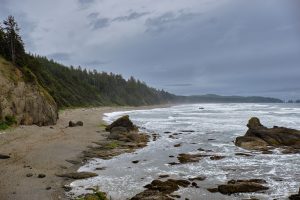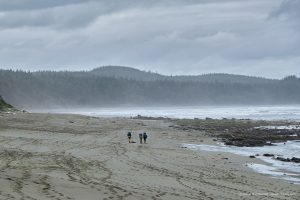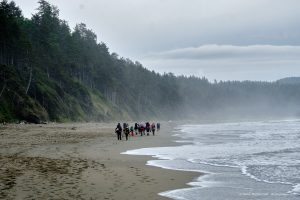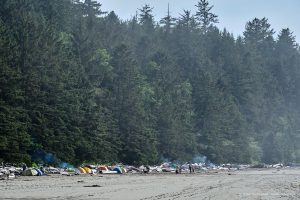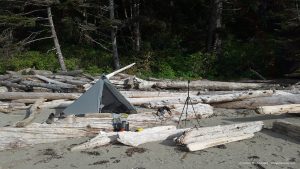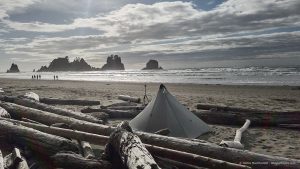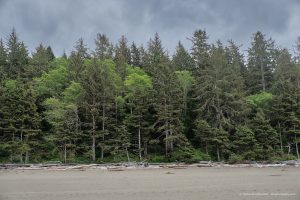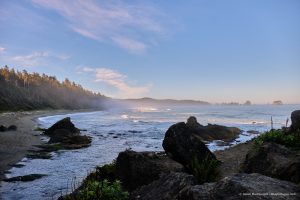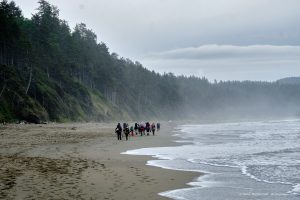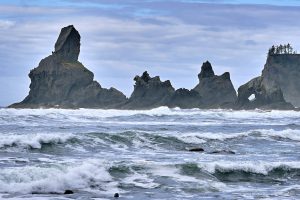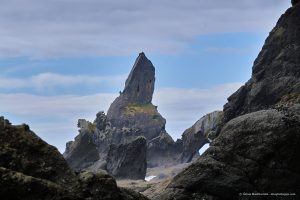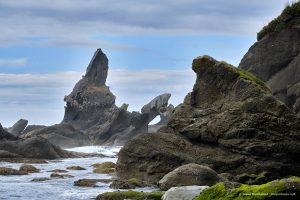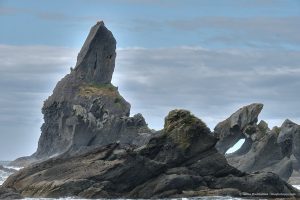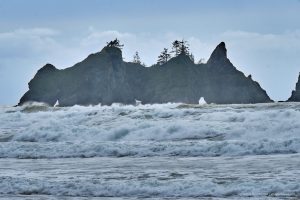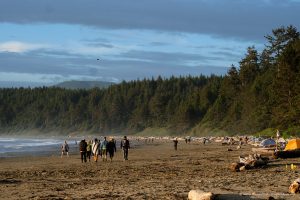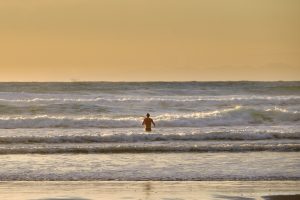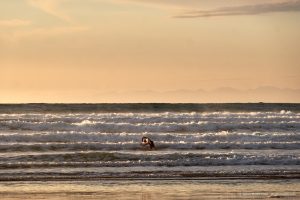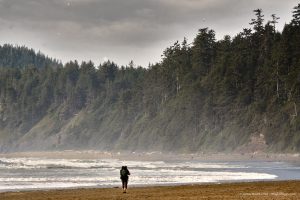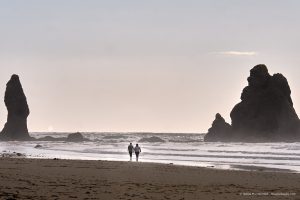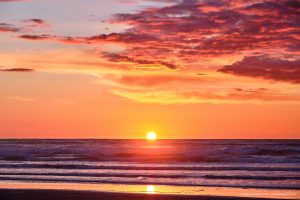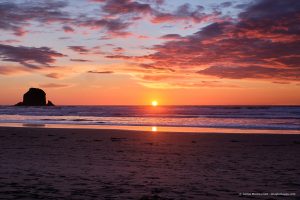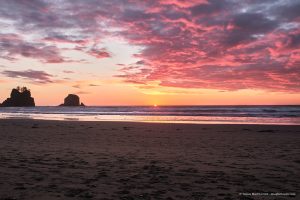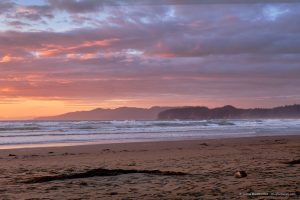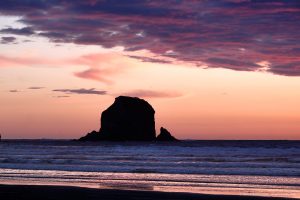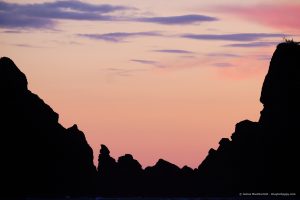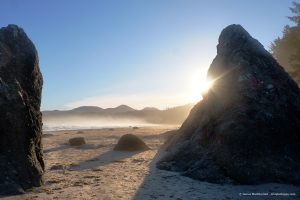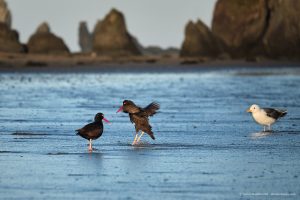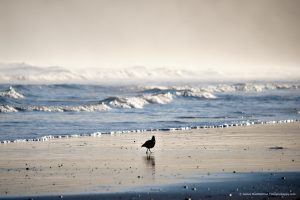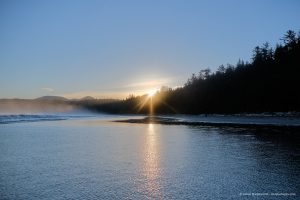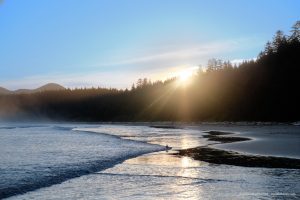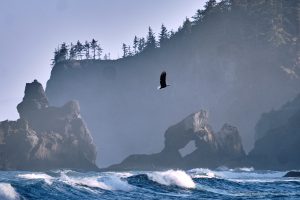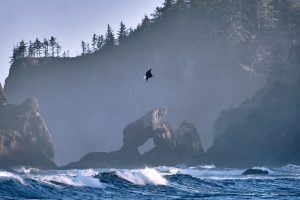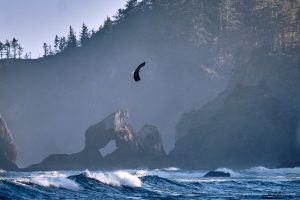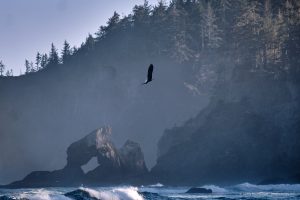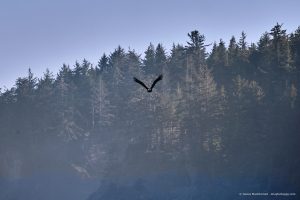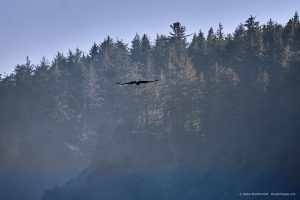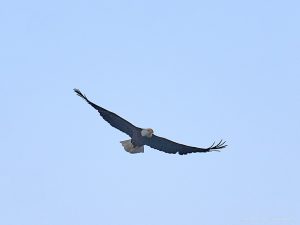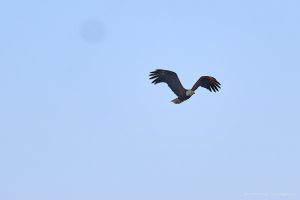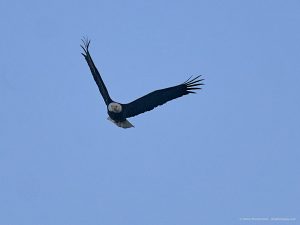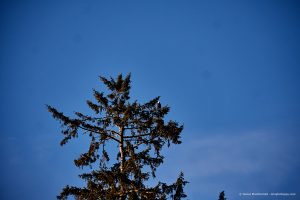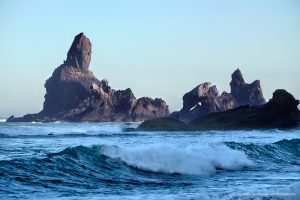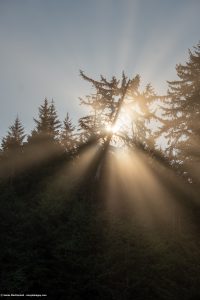I open my eyes and see stars. There were no stars when I’d finally closed them, it hadn’t been easy, the last light of day just leaving a sky blotted with high broken clouds, the sound of waves and the smell of camp smoke, two glasses of wine buzzing in my veins, my mind still ringing with the days thinking, eventually slowing, finally those thoughts fading into the white noise of the surf, I follow them into sleep here at the edge of the continent camping on Shi Shi Beach.
But now the stars shine bright and clear above my head. A satellite traces a silent blinking path across the sky. The fire beside me now just a smoldering mass of black embers, still casting off a faint heat as I prop myself on my elbows and look to see how far the tide has come in. The weak light of a waning moon just barely illuminates the repeating white lines of surf. I try to remember what I was thinking off just before sleep, then stop, because why?
I lay my head back down. I look for awhile longer. Then I close my eyes again and my unworried mind goes back to sleep.
Shi Shi(“Shy Shy”)Beach is a two mile arc of sand and storm-tossed driftwood back backed by a tangled coastal forest, on a noncontiguous strip of Olympic National Park, and I made my reservation on Recreation.gov several months ago, but I still have to stop at the Wilderness Information Center in Port Angeles to exchange my email confirmation for a wilderness permit, and on the the Saturday morning of Memorial Day weekend the line at the WIC stretches to the parking lot, quadrupling back on itself before even entering the building.
Taking a place at the back, I settle in for what I guess will be at least 90 minutes. I lived in Manhattan for eight years, where standing ‘on line’ is a way of life, and have spent hours in boarding scrums at airport gates, situations where people seem to believe that if they just stand alittlebitcloser to the person in front of them, the line will move faster.
Here though, despite some mutterings about why we couldn’t just use our email confirmations as permits, and a few befuddled people who thought it would be a breeze to just show up on the first three day weekend of summer and pick up a walk-in permit to any popular destination, as if no one else had thought this might be a good weekend to go camping, proper personal space is respected, the crowd relaxed and happy.
A ranger makes his way down the line. When the group two spots ahead of me tell him they have a email confirmation for a permit, the ranger runs through the obligatory checklist of park regulations and says that because of the line, for this weekend only, it would be okay if he just signed their email confirmation and sent them on their way.
I exchange looks of ‘Did we just hear correctly?’ with the group behind me, also holding an email confirmation, and we all sigh with relief. Soon enough we will be on our way.
Being on my way to Shi Shi Beach is relative though, as it is still a two hour drive from Port Angeles to the trailhead, and I am nervous about parking. Trailhead parking is limited, and only open to dayhikers. If you are camping at Shi Shi Beach, you have to park on the private land of local residents, members of the Makah Tribe, who charge $10/day for the privilege. Every frittered minute is someone getting there ahead of me, so I press on as I see tempting flashes of rocky beaches through breaks in the trees, glimpses of the ocean ahead as I topped a rise and round a curve. Vancouver Island, Canada is no more than 15 miles across the Strait of Juan de Fuca, so close that my dash-mounted phone jumps on the Canadian 4G network at points as it tracks my progress.
One more stop is required as well, at Washburn’s General store in Neah Bay, to pick up my a $10 recreation pass to access the Makah land which surrounds ONP here. From there the roads narrow, the speeds limits drops to 25 and then 15mph, passing through a landscape that could be rural anywhere. Signs tacked to trees warn of the dangers of substance abuse and addiction. I pass a sign for ‘Donna’s Parking’, but underneath the sign is a piece of plywood spray painted ‘CLOSED.’ Okay. There must be more parking. I hope. What if there isn’t? There has to be though. Right? But even so, won’t that one be full with other campers? And then what? I drive home, defeated? Why would they close to parking on such a busy weekend? I should be fine. It’s hard to imagine getting here much earlier than I did. Unless you got to the WIC on Friday and picked up your permit yesterday. Should I have done that, paid for a hotel in Port Angeles? I drive on.
Two minutes down the road, there is another sign for parking. The lot is packed. I pull in and around a house trailer on a narrow driveway, where an amiable young man smoking a cigarette tells me I can park behind his car for a minute, as there is a couple preparing to leave. He is wearing a waist pack, and I assume he is in charge. The couple leaves and I pull in and park and fill out my payment envelope, double checking that the windows of my car are up and the doors, locked before heading on my way.
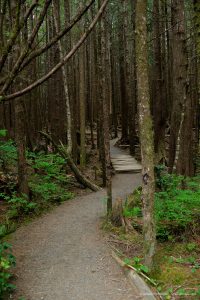
It’s a half-mile hike down the road to the trailhead, where I enter the coastal forest and soon overtake a group of women moving more slowly than I. The trail is narrow for passing, and rather than having the slowest hiker set the pace, as is proper, they’d put her last, so the three are strung out along 20 or so yards of trail, and to pass I’d have to excuse myself around each of them in succession, which would mean announcing my presence and requesting to pass not once but three times, which is three times too many for an introvert who prefers to avoid the sound of his own voice in the city let alone the wilderness.
I settle in at a respectful following distance and do my best to match their pace. There is no hurry. It is only two miles to Shi Shi beach and I tell myself it is good practice in taking things more slowly.
My thoughts drift back to the car. Why didn’t I ask what happens when the lot gets overfull? Do they park people in based on their length of stay? They couldn’t possibly, right? Should I go back and ask?
Soon the lagging hiker hears me and announces to her friends that there is a faster hiker coming up behind. I prepare to smile politely and pass, but her two friends just turn, briefly look at me, and then start back on their way. I don’t blame them. If I were them, I’d be thinking that by allowing me passed, I’d get to the beach first and claim the exact campsite they would have chosen.
Trip reports promised muddy stretches along the trail, and there are several; but all of them have developed circumventing use paths around them, which, of course, will eventually become mud pits, at which point people will wear paths further into the surrounding forest to keep their boots dry. I slip past the slow group when they take one of these bypasses and I just get my shoes dirty taking the direct route.
The trail drops steeply 200 feet to Shi Shi beach, where the sky grey and the sea stacks bracketing each end of the beach are shrouded in spray tossed off by the repeating white lines of crashing waves, tinting the air blue-grey.
Colored specks of tents dot the high tide line, pressing up against the dense coastal forest.
I talk myself down from rising frustration at an issue that doesn’t yet exist, letting the sound of waves do their mind clearing work. Beyond Petroleum Creek, the driftwood piled along the shore is more numerous, and campsites are scattered among the jumbled logs.
There are several promising sites, but I continue down the beach to the end, just to be sure. I can’t help myself. There might always be something better just a little further on.
But there is not, so I double back, drop my pack, unpack and set up my shelter in a triangle of driftwood.
Unburdened, I walk South a quarter mile to Point of Arches, where people pick their way around tide pools. I rock hop around the headlands and see a small, stony beach. The map shows a trail leading up from somewhere farther on and continuing down the coast. I think to go and find it, but it is getting late in the day. High tide will be around 7pm, but I am not sure at what point before then it will become too risky to round this rocky shore back to camp, so I leave exploration for another day, turning and heading back north.
This walking turns into an elongated pacing as I think more fleeting thoughts about myriad things beyond my ability to control. Oceans and wild beaches are readymade for such thinking.
http:/https://youtu.be/YRLacGFI6uc
I wish I’d asked the guy back at the parking area what happened when the lot got full-up, as it surely would. I didn’t want to return the next day to find myself unable to leave. I’d only packed one night of food. Who would feed my cat if I was stuck here?
And that thing at work; what will I do about that?
Some of this anxiety was inherited from my Dad, who came by it honestly when, his Dad died when he was 11. My Dad died three months ago, and the two years leading up to his death had been full of slow and then rapid declines, during which time worrying had become more than a habit. I wake in the middle of the night with 3am dreams of personal failings and regrets. Now it is a slow, gradual process, unlearning worry and accepting that there is always a shoe somewhere waiting to drop and there is often nothing that can be done to stop it.
I try to remember what it was like not to worry. I once went to see a friend who was in the Peace Corps in rural Guatemala. He told me the name of his town, and that his house was the one at the top of the hill with the big pile of rocks in front. I took buses the whole way through Mexico into Guatemala and I found it. There were no smart phones, I used a paper map and a guidebook and assumed there would be a way to get from point A to Z, and for the most part, there was. It didn’t seem like a big deal, I just went.
Another time, I moved to San Francisco, alone and with no job and no plan, assuming things would work out, and they generally did.
It’s hard to imagine doing such things now. So much could go wrong! What changed?
Age, I suppose. Things go wrong in life, and those things accrete until you have a sizable backlog of evidence that things don’t always just work out.
Lost in these thoughts, the tide, ever recurring, washes over my shoes, soaking my feet.
http:/https://youtu.be/65xzyIqRJjc
Climbing the headland demarcating the north end of the beach, I take in the long view to the south. It’s pushing 6pm now, now but campers still trek in, backpacks loaded with as much as they can carry. The day is turning sunny.
On my walk back, I stop and purify water at Petroleum Creek, the water a weak-tea brown from the tannins leaching from the surrounding forest. I hope all the people camped right up to its edge are using sanitary bathroom practices.
Back at camp, I boil water to rehydrate dinner and watch as people continue to drift in, eyeing for an available space and filling in the empty gaps between tents.
A ranger makes his way down the line of tents, checking for permits and bear canisters.
Blue smoke trails drift from campfires up and down the beach. I hadn’t planned on building a fire. Usually I’m camping above treeline or in a place too dry to safely have a campfire, so I’ve never gotten in the habit. But despite the danger of burning driftwood, it seems a waste of an opportunity not to do so. I collect the variously required sizes of wood and lay a piles of kindling on top of some dried grass, building a small teepee of pencils-sized sticks. Holding the lighter to the grass, the flame took, but burned too quickly to ignite the twigs.
Starting a fire shouldn’t be difficult. Primitive man learned to control fire hundreds of thousands of years ago, and unlike them, I have a mini bic lighter. So I sit and think on it. The whole trick of the fire(absent a firestarter or liquid fuel) is to build slowly, from tinder to kindling to firewood The grass burns too quickly to ignite the kindling, so I need something in between. I take out my pocket knife and use it to shave wood off one of the pieces of driftwood. Not so long ago, in an effort to save 2 ozs of packweight, I’d have been carrying a single boxcutter blade rather than a pocket knife, good enough for cutting pieces of moleskin to cover blisters but not for shaving down wood for tinder. Some things are worth their weight. I take my curled pile of woodshavings and lay it on another, smaller bundle of dried grass and rebuild my teepee of kindling sticks.
Again I light the grass, and again it flames high and quickly, but just long enough to pass the flame to the shavings, which pass the flame to the twigs. I slowly add pieces of increasing diameter to the growing fire, and eventually I’m confident that it is going to the point I can let it be.
http:/https://youtu.be/dO8ft-9TlCc
It is a simple, primal thing, building a fire outside. It is no great achievement, yet it gives an outsized satisfaction. So many of the basic skills necessary to survive are now outsourced and/or mechanized, from building our own shelter to growing, catching and preparing our own food to even thinking and planning, that maybe the simple act of picking a campsite to setting up a tent and building a small fire for warmth – at the edge of the sea no less, from which depths life emerged – allows me for a moment to perhaps pretend that maybe I could survive out here if I needed too. . . I couldn’t of course. I’d be dead as soon as my food supply ran out. But for a moment, I can imagine otherwise . . .
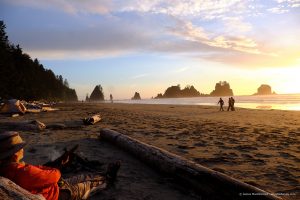
The flames dance and entrance. I now have all four elements at my disposal. Sunset is at 9:04pm, and with the wind consenting to blow in a consistent direction, I can sit to the leeward side of the fire and settle in to watch and drink the wine I have decanted into two 8oz plastic water bottles scavenged from airline flights for the purpose. I put my wet shoes near to the heat to dry.
Campers stroll the surf or play in the waves.
The gravity tugs the tide in and the sun sinks closer to the horizon.
Clouds cover the stars as I finally start to feel sleepy. The fire, now a small mass of glowing embers, still throws off enough heat that I don’t feel the chill of the night descending. I decide to gather my sleeping bag and bivy sack and set them out here and to sleep under the sky. It was not supposed to rain and if it did, my tent was 10 feet away.
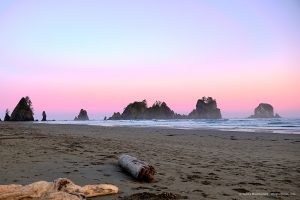
I don’t always sleep well outside, a combination of nerves(things going bump in the night) and discomfort in degrees that vary with the location and circumstances, but here, though, I drifted in and out of sleep, sometimes waking to stars, sometimes to clouds, once to pee, picking my way barefoot through the driftwood the the forest edge – I sleep a guiltless sleep and rise refreshed at dawn. The sun will rise behind me and not appear in the sky above the treetops for some time, but the leading light now pinked the sky just above the horizon. No morning gloom; it was going to be a bright and sunny day.
I pour water for coffee into my Jetboil, heat it, and sit next to what remains of the fire, all black coals now but still emanating a faint warmth. I think to restart it, but I want to walk the beach, and can’t then leave it unattended. Safety dictated I put it out for good before I walk away, so I throw sand over it and douse it with my remaining water. Before I left I’d dig a hole and bury it to remove as much trace of my having been here as possible, but for now, this was adequate.
I put on my sandals and take my camera, starting toward Point of Arches. Hopping rocks around the headlands, the tide now low and set to stay that way for a time, I venture to explore the small, rocky beach to the south. maybe find that trail. It takes all of 10 minutes to traverse the beach, but I find no enthusiasm for further exploration. There’s nothing wrong with leaving something for next time.
Not many are up yet, so I have the beach mostly to myself as I walk slowly north, the sun edging above trees, pouring golden light onto the tide as it washes over the beach. The foaming tide hisses and sizzles as it draws back over the sand, humming the air with a crackling electricity.
I see movement ahead, a large flapping thing rising up from the tideline and landing on a sea rock just off the shore. It is a bald eagle. I put my camera to my face and snap as many pictures in succession as possible as it takes flight again. It is spray and pray, no time to set focus to tracking or shutter release to continuous. I manage to capture a few decent shots, I think, before it lands in a tree with a companion high above.
People are rising as I make my way back south. I feel a twinge of regret that I am not staying another night. There is not much else to do but walk up and down the beach.
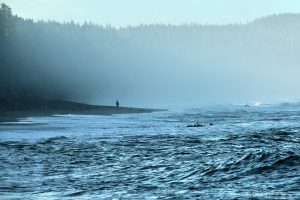
Back and forth. It’s about a five mile round trip, sixty minutes or so. A few more times and maybe my thoughts will start to oscillate in harmony with the waves. It would be good practice in just being bored, doing nothing.
But . . . there are other parts of Olympic National Park I want to stop at on the the way back – Elwha Valley or perhaps Hurricane Ridge. It’s a long journey out this way – pushing four hours driving and more, a bit long for dayhiking – so I want to take advantage while I’m here. I can’t stop myself from seeking.
My unused tent is wet with morning dew, so I spread it, along with my sleeping bag and bivy sack, across driftwood to dry a bit.
I drink more coffee while I watch and listen to the waves. Sometimes it seems like the only way I can truly appreciate a moment is with the knowledge that it is passing.
Around 1130 I pack up and am on my way. I pass day hikers making their way in. Cars line the road in to the day parking lot. My car is fine. There is not much room to maneuver out of the lot, but with some cooperation among other departing and now arriving campers, I am able to make my way out onto the road. I roll down the window. It is a glorious day and I will be home in a few hours.

